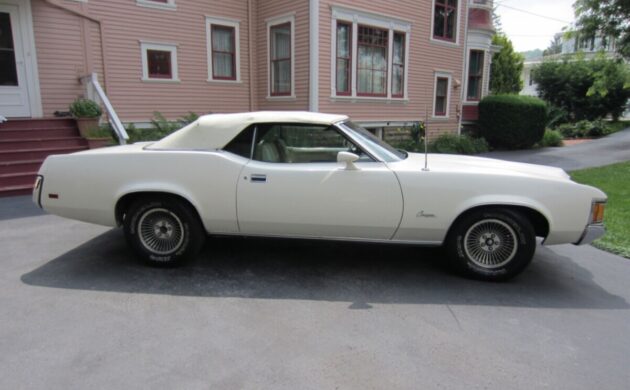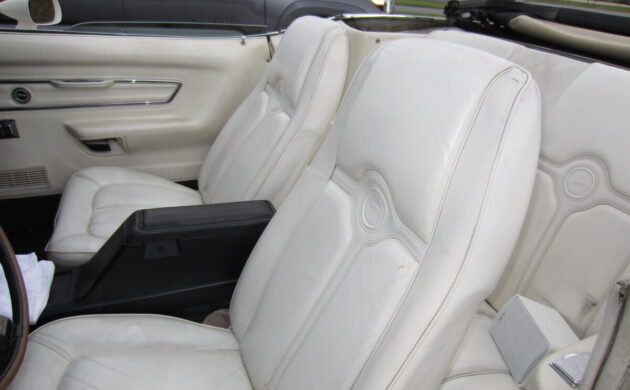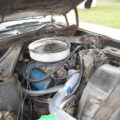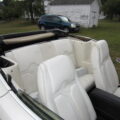BF Exclusive: 1972 Mercury Cougar XR7 Convertible
Mercury introduced its Cougar range as a more luxurious alternative to Ford’s Mustang. They did so despite the initial misgivings expressed by the parent company’s management, but it proved to be a wise decision. By the time Mercury closed its doors, the Cougar nameplate in its various forms was written into folklore as the best-selling vehicle range in the company’s history. Our feature car is a 1972 Cougar XR7 Convertible loaded with optional extras. It has been part of the same family since 1973, but declining health means the owner has no choice but to part with their treasured classic. They have listed it here on Barn Finds Exclusive in Coudersport, Pennsylvania. You could park it in your garage today for $16,000 or best offer.
Mercury introduced its Second Generation Cougar in 1971, and it remained in production for three model years. Like the Mustang upon which it was based, the car was physically larger than its predecessor. However, it was also significantly more luxurious. Our feature car rolled off the line in 1972 when the company successfully sold 53,702 vehicles across all derivatives to an eager customer base. However, only 1,929 of those were the XR7 Convertible model, making this a relatively rare classic. The seller’s father was a wise man, purchasing the vehicle in 1973. He recognized that new cars depreciated significantly during their first year, so he utilized that knowledge to secure this car in June 1973. It presents beautifully in its original Code 9A White. The paint shines impressively, with no apparent flaws or imperfections. The panels are straight, with tight and consistent gaps. The supplied photos reveal no evidence of rust, and the seller doesn’t mention any issues in their listing. The fact the car has always been garage-kept bodes well in that department. The White power top looks excellent, while the same is true of the trim and glass. This Cougar has been a cherished part of the same family for nearly five decades, and its overall condition is a testament to its treatment throughout its life.
The VIN for this Cougar indicates that its engine bay houses the H-Code 351ci V8 that produces 164hp and 277 ft/lbs of torque. It is unclear which transmission this car features, but if it is the three-speed automatic, which was the option preferred by most buyers, it would allow the vehicle to cover the ¼ mile in 17.8 seconds. Refreshingly, the seller doesn’t make outrageous mileage claims about this car. They indicate an odometer reading of 150,000 miles, although potential buyers should still consider this low for a vehicle of this vintage. Given the bulletproof nature of the drivetrain components, it is possible that the next owner could at least double that figure before facing any significant mechanical refurbishment. The buyer won’t need to spend a dime beyond the purchase price on this XR7 because it is a turnkey classic ready for a life of relaxed top-down touring with a new owner behind the wheel.
This Cougar’s interior helps it make a bold visual statement reinforcing its luxury leanings. The original owner ordered this classic as a white-on-white-on-white vehicle, which was a brave move. White upholstery generally doesn’t age well, but the care this Cougar received throughout its life means it is not an issue. There are no interior photos, but the seller doesn’t mention any problems or flaws. They also say it has all the bells and whistles, and while there are no specifics, I suspect that includes air conditioning, power windows, a console, and an AM/FM radio. The seller is approachable and willing to answer any questions on this matter.
When Mercury closed its doors in January 2011, it was another brand that succumbed to dwindling sales and economic rationalism. Ford shows no signs of reversing that decision, meaning there is little chance they will revive the marque in the foreseeable future. That means that not only has the world lost a manufacturer that produced some exciting and desirable models, but preserving classics like this Cougar XR7 Convertible becomes more critical. The current owner’s family has done an excellent job of this for nearly five decades, and I hope that its new owner will continue that philosophy. Do you feel up for that challenge?
- Location: Coudersport, Pennsylvania
- Mileage: 157,000 Miles
- Engine: 351 cui V8
- Transmission: Automatic
- VIN: 2F94H547622
- Title Status: Clean
Auctions Ending Soon
 2002 Subaru Impreza WRXBid Now17 hours$333
2002 Subaru Impreza WRXBid Now17 hours$333
 1975 Chevrolet Corvette ConvertibleBid Now18 hours$4,000
1975 Chevrolet Corvette ConvertibleBid Now18 hours$4,000
 1964 Ford F-100 Camper CustomBid Now19 hours$2,000
1964 Ford F-100 Camper CustomBid Now19 hours$2,000
 2006 Jeep Wrangler SportBid Now2 days$11,000
2006 Jeep Wrangler SportBid Now2 days$11,000
 1974 Datsun 260ZBid Now4 days$750
1974 Datsun 260ZBid Now4 days$750

















Comments
That H code Cleveland is probably a 2V with FMX transmission, and non nine inch differential. A lot more grunt can be had with dual exhaust, a new manifold/4V, and a nine inch 3:55 locker. These are wonderful cars. I’d be partial to magnum 500’s.
Never saw a 1967-1973 Cougar with out a 9″………
The 1967-1968 Cougars that were equipped with a small block V8 (289 or 302) left the factory with an 8″ rear axle. Only the ones equipped with a FE big block engine received a 9″ rear axle. All 1969-1973 Cougars left the factory with a 9″ rear axle no matter which engine was under the hood.
My ‘72 H code XR-7 (non-convertible) had a 9”
I Had a Black 73 XR7 Conv. 73’s actually look the best they had the same body but a different Grill and Taillights. My car was odd being an XR7 instead of having the wire wheels like most had mine had Dog Dish Hubcaps and trim rings with RWL Tires which gave it a more sportier look as opposed to being a blvd cruiser even the most diehard GM fans would tell me that is a good looking car. Magnum 500’s were not a Cougar option when new.
The 1972 Cougar was based on the Ford LTD, not the Mustang. They were a much larger car at this time I have the Mustang! I don’t remember any of the Cougars actually being based on the Mustang chassis/body.
The Cougar was Mustang based until ‘74, when it moved to the Torino/Montego platform.
I see a lot of the Montego in the front end, my mother loved them and had several thru the 70s.
WRONG! We had 3 in our family 70, 71 & 73 they are all reskinned Mustangs with similar dimensions LTD’s were much larger in. In 74 they switched platforms and would have been similar to a Torino.
The 1972 Cougar was based on the Ford LTD, not the Mustang. I don’t believe any of the Cougars wherever based on the Mustang. They were much larger than the Mustang.
The first generations were based on the 67 Mustang. Later the Cougar grew.
Mark – I owned a ’67 Cougar and can assure you it shared the underpinning of a Mustang as I often used Mustang parts to repair it, as was the story for all 1st generation Cougars (’67 – ’70). Some will say as it grew in the second generation, below link states it was still a shared platform with the Mustang:
https://en.wikipedia.org/wiki/Mercury_Cougar
I’ve also read articles that associated them with Torino chassis, but not LTD. While the ’72 looked much larger than the Mustang, it was only 2″ longer.
Mark, completely untrue.
Weird how people seem to just make stuff up.
That’s the ’74 you’re thinking of
The Mustang and the Cougar share the same platform , they are no bigger. The Cougar went to the midsize Montego platform in 74 when the Mustang was downsized.
They were based on the Mustang right up to the 1973 model year. Then it grew and the Mustang became the Mustang II.
The 1971 – 1973 Cougar was based on the Mustang platform, with the wheelbase stretched 3″ from 109 to 112 inches. Track width front and rear (61″ +/-), and suspensions front and rear, are identical to the Mustang. The LTD was much larger (121″ wb, 63-64″ track width) and had substantial differences in the frame, suspension, etc. You wouldn’t want a “sporty” car based on that behemoth.
Trust me on this one – I spent most of my teen years as a lot rat at a Ford/Mercury dealer where my dad was the body shop and service manager. There isn’t a mid 1970s FoMoCo product that I haven’t ridden in, studied, and crawled all over. ;)
Dude, you’re mistaken.
The first two generations — 1967-70 and 1971-73 were based on the Ford Mustang platform. The 71-73 Mustang was a lot bigger than its predecessors too. The third generation, which was based on the Torino platform could’ve conceivably been considered an LTD, if you’re willing to stretch that definition to the first version of the LTDII.
See for yourself:
https://en.wikipedia.org/wiki/Mercury_Cougar
No it was based off the Mustang.
True. The Mustang and Cougar were unibody cars, the LTD was a full size, full frame behemoth. The Torino switched to body-on-frame construction for the 1972 model year, but was a unibody car before 1972.
I have a 72 cougar XR7 it could pass for the cousin of the one on this sight I bought it new in 72, the doors are off a 72 mustang, rear quarters off the same car. It has a 351 Cleveland with a 4 barrel carb. It has 12,500 miles on it and has been in storage for 25yrs. It is white with a brown interior a has a new Cambria top in the box, and the frame has been totally rebuilt. My son started to put it back together than passed away in2008 and it has been sitting ever since. maybe I will finish it someday
The 71-73 cougar was the same platform as the 71-73 mustang. The 74 on cougar was on the Torino platform.
Looks like they took a wrong turn on the parade route!
Then maybe they were kicked out of the parade.
Pass on this “all options” brag…..heck the owner can’t even afford the caps for those later model wheels – what else is this car short on for that kind of money ?
I had a 71 Hardtop Cougar. The motor blew on Xmas eve stranding me a couple of miles from a pay phone. Had just left my parents house with my future ex wife. Took a couple of weeks to find a used engine for it, Got that put in an traded it for a brand new 1981 Mercury Capri that would do 55 MPH top speed up hill down hill and off a cliff. Beautiful car to look at, but it just couldn’t get out of it’s own way. Should have kept the cougar.
Mercury kind of dropped the ball not having a hidden headlights option on the 71-73 models.
Now this is a car worth the price and compared to that skeleton Mustang is a better deal by far. Smart buyers will put their money in a car like this rather than a pile of scrap metal priced in the stratosphere.
Thanks to the true enthusiatics that know their stuff. Guys and gals, it’s true the cougar was akin to the Justin through 1973 model, then starting with 1974 it joined the Torino framed model and in 1977 joined the thunderbird platform. Please, I sold them all and know these cars!
I am curious if that 351 mill is a Windsor or a Cleveland, though. Lots of hop up parts either way, the engine builders seem to prefer the Cleveland, although the Windsor lasted longer in Ford’s engine portfolio. I am also curious if the automatic transmission is a C4 or a C6 gearbox? The C4 was generally paired with small block applications like the 289/302/351, the C6 was reserved for big block applications (390 and up), but there may have been exceptions.
Robert, this is a Cleveland engine, you can tell by the wider valve covers. It was usually paired with the FMX transmission, which is a descendent from the original Fordomatic transmission with a cast iron case and aluminum tail shaft. Tough as a C6, but heavier. You are correct, the C4 was used behind lower hp Windsor engines, but there was also a C6 that went behind some higher hp 351 Windsor engines as well.
Thanks for the information. The FMX must have been an intermediate step between the C6 and the Automatic Overdrive (AOD) transmissions that were among the first electronically controlled transmissions that started appearing in the 1980’s.
This is weird, second Cougar convertible in 1 week.